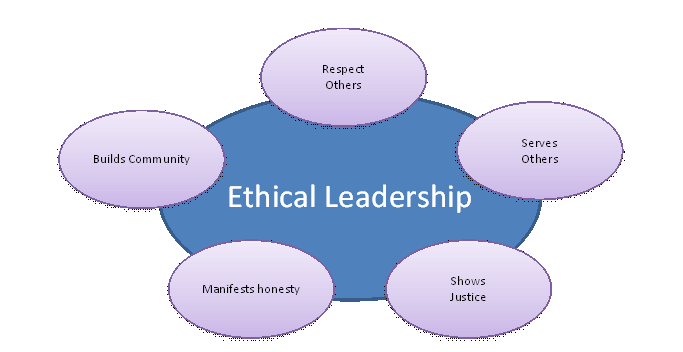In all functions of leadership, ethics constitutes an important subject. Scholarly evidence suggests that ethical behavior in leadership correlates directly with organizational and individual effectiveness (Rubin, Dierdorff, & Brown 2010). Walumbwa et al. (2011, p.204) define ethical leadership as ‘the demonstration of normatively appropriate conduct through personal actions and interpersonal relationships, and the promotion of such conduct to followers through two-way communication, reinforcement, and decision-making.’ From this definition, this section expands on the debate on the roles of ethical leaders’ behaviors in enhancing individual and organizational effectiveness. Figure 4 shows the elements of ethical leadership.

The debate on ethical leadership or individual and organizational effectiveness has two sides of scholarly interest. One side of the debate holds that ethical leadership behaviors ensure organizational effectiveness through increasing employee morale and perceptions of other organizational stakeholders. Critics of leadership ethics consider subscription towards some ethical behaviors inappropriate as they minimize opportunities for organizational success. For instance, leaders who focus mainly on profit maximization may foster the exploitation of the society, which correlates negatively with the objectives of social corporate responsibility. However, critics of this debate claim that profit maximization is necessary to avail more resources for committing to social corporate responsibility, remunerating employees better, and even increasing returns of investments.
Leaders play critical roles in ensuring that employees execute their roles according to the rules set out to guide the operations of an organization. One of the mechanisms of managing employees is orienting them to a common organizational behavior through the prescription of common organizational codes of ethics. In this context, ethics refers to standards of behaviors or conducts. It involves the evaluation of individual values, possession of knowledge on communal principles, and individual standards (Kalshoven & Hartog 2009). It also entails the development of the capacity to make well-informed choices and/or realization of the impacts of the choices made on a short-term and long-term basis. Where choices result in undue repercussions that may impair an organization or individual’s achievement of preset standards of conduct, codes of ethics demand such persons to take the responsibilities for the repercussions of their choices. As such, individuals take charge and responsibility for organizational effectiveness through ethical leadership.
Organizational effectiveness is a function of individual employee effectiveness in executing the tasks of an organization. The effectiveness of employees is enhanced by many factors that include motivation, job satisfaction, and minimal destructive conflicts in the work environment among other factors. This finding implies that leaders’ ethical behaviours that correlate with organisational effectiveness must also influence factors that lead to increased employee effectiveness. Kalshoven and Hartog (2009) provide evidence to this relationship when they reveal how the existing scholarly research addresses positive relationship between ethical leaders’ behaviors and positive attitudes of followers together with behaviors such as job satisfaction, trust in leaders, organizational commitment, and better work-life fits. Such employees believe that organizations serve their needs optimally. For instance, the Google Company believes that building an effective workforce requires the deployment of good leadership, which focuses on two-way communication to help mitigate challenges that are associated with employing people from diverse backgrounds.
The Google Company believes that failure to manage diversity can lead to poor job satisfaction, reduced workforce morale, and the emergence of destructive organizational conflicts. These challenges can hinder the building of positive relationships among employees. This situation will in turn hinder knowledge dissemination and sharing. Hence, the innovative and creative capacity of the company, which is its central pillar for effectiveness, becomes negatively impaired. Using this example, a leader who seeks to lead by embracing leadership ethics must sacrifice his or her ego that is associated with autocratic and authoritative leadership to foster two-way communication. This claim implies that the leader is not the overall decision-maker. Under the perspectives of ethical leadership, concerning a video by Cook (2013), the Apple chief executive officer, followers must engage in decision-making processes. In this context, focusing on ethical leadership behaviors may subject an organization to some challenges, especially in terms of implementation of new policies, where compliance with dictatorship and bureaucracy is required. Consequently, overdependence on ethical leadership to drive organizational effectiveness may increase the problem of resistance to change until when an organizational crisis occurs.
Conclusively, leaders’ ethical behaviors are imperative in fostering positive individual manners together with attitudes towards work. This outcome can increase organizational effectiveness, especially where an organization utilizes its people as its source of competitive advantage. Ethical leadership reduces deviant behaviors among employees. Indeed, during such situations, one-directional communication, as opposed to two-way communication, is the most pragmatic way of enhancing compliance. Unfortunately, it is considered unethical leadership behavior.
References
Cook, T 2013, Apple CEO Tim Cook on Ethical Leadership, video recording, Video Education Australasia, Bendigo, VIC, Web.
Kalshoven, K & Hartog, D 2009, ‘Ethical Leader Behaviour and Leader Effectiveness: The Roles of Prototypicality and Trust’, International Journal of Leadership Studies, vol. 5 no. 2, pp. 102-118.
Rubin, R, Dierdorff, E & Brown, M 2010, ‘Do Ethical Leaders Get Ahead? Exploring Ethical Leadership and Promotability’, Business Ethics Quarterly, vol. 20 no. 2, pp. 215-236.
Walumbwa, F, Mayer, D, Wang, P, Wang H & Workman, K 2011, ‘Linking Ethical Leadership to Employees’ Performance: The Roles of Leader-Member Exchange, Self-Efficacy, and Organisational Identification’, Organisational Behaviour and Human Decision Making Processes, vol.115 no.2, pp 204-213.